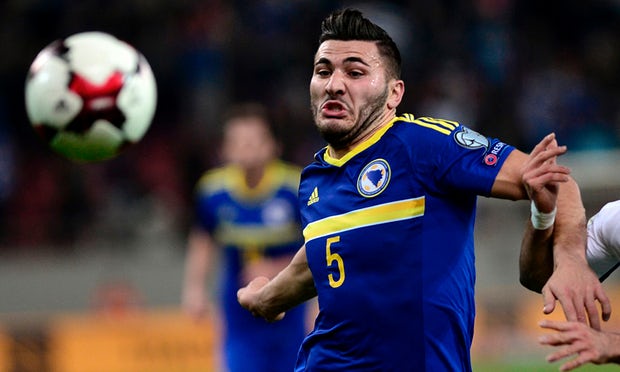London – There was a twist this year to Arsenal’s annual late-season injection of hope in that it came with a change of formation. Can a conversion to a back three really, after all these years, be the recipe that actually delivers jam tomorrow? Yet it’s not even clear that Arsène Wenger intends to stick with a shape of which he was once openly scornful, and that means that every transfer, every rumour, will be analysed not merely in terms of the player, but for what it may indicate about Wenger’s vision of the future.
The free-transfer signing of the Bosnia-Herzegovina left-back Sead Kolasinac from Schalke on a five-year contract this week makes the picture very little clearer, but what he should offer is flexibility and a steeliness Arsenal have often lacked. Although Kolasinac was not a regular wing-back with Schalke or his country, and has made his reputation as tough, powerful defender, there seems little positional reason why he could not operate as either a left-sided central defender or as a wing-back – as well as in his more familiar full-back role. He has, after all, played 19 games for Schalke as a wide midfielder (and four more in the centre of midfield), even if his more obvious assets are defensive.
Whether he has the technical capacity to operate as a wing-back is less certain, but Kolasinac is capable of getting forward and nobody has ever doubted his work rate or commitment. He scored three goals and set up five in the Bundesliga last season. No other defender registered so many assists (even if the stat is slightly diminished by the fact that some of them came when he was playing in midfield).
That should not, though, be taken to suggest he is a great passer or brilliant crosser of a ball and in that sense he is not an obvious fit for Arsenal – which may, of course, be no bad thing. He is frenetic and aggressive, somebody who relishes a physical challenge. There are not going to be many filigree interchanges involving Kolasinac and, say, Mesut Özil, but he is emphatically robust. “Sead is a tree,” said the former Schalke manager Jens Keller. “He gets hit on the head, but just shakes it off and continues to play superbly.”
Kolasinac was born in the German city of Karlsruhe, where his father, Faik, works in the Mercedes factory. Faik is a Montenegrin from Niksic who in 1969, when he was 10, moved to Capljina in Bosnia-Herzegovina. He played amateur football there and shares a similar muscular frame to his son. “It’s all genetics,” his father said. “When Huub Stevens [then the Schalke manager] saw us sitting together he said it was obvious where he got his physique from.”
Although Kolasinac played at youth level for Germany, he has always identified with Bosnia. He listens to Bosnian music and even when he was at Schalke, living in Gelsenkirchen, he would go back to Karlsruhe once a week to eat his mother’s burek and cabbage rolls. Until Kolasinac started playing, he would join the crowds watching Bosnia’s national team games on a big screen at his local mosque. Religion played a significant part in his upbringing. Faik remembers that his son would sometimes skip school to go to classes at the mosque and that there were times when he would go hungry rather than eat pork.
From a global perspective, Kolasinac is perhaps best remember for the early own goal he scored against Argentina in Bosnia’s first game at the 2014 World Cup. Safet Susic’s unusual tactical gamble meant Bosnia then didn’t play with a left-back against Nigeria but Kolasinac returned for the win over Iran. Three years on, as the arguments over Susic’s selection for that second match have begun to fade, the most striking aspect about Kolasinac’s World Cup, perhaps, is how untroubled he seemed by the own goal. A 20-year-old could easily have collapsed after scoring against his own side at the Maracanã three minutes into their first World Cup but Kolasinac was impressively solid thereafter.
Given Arsenal’s tendency to wilt at the first glimpse of pressure, that grittiness will be a useful addition. Again, that suggests that Wenger, at last, has acknowledged that not all the world’s problems can be solved by neat, slight midfielders with nice hair. Arsenal’s May uptick this season felt different to what had gone before because it involved such a radical structural change, such an admission from Wenger that his tactical outlook required modification. The signing of Kolasinac suggests that the process of reform, a return to a more physically aggressive Arsenal, is continuing.
The Guardian Sport
